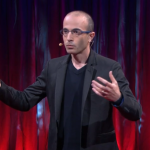Molecules and Mourning
Materialism has always had a difficult time dealing with death, because it has to claim that death is not a big deal. If there is nothing more to life than the matter of the body, once the body dies there is nothing left to “experience” death.
The ancient atomists were explicit in this claim, with Epicurus stating:
"Death, therefore, the most awful of evils, is nothing to us, seeing that, when we are, death is not come, and, when death is come, we are not."
While it is debatable how palatable this line of argument can really be when facing one’s own death, it is particularly impotent for comforting those who mourn a deceased loved one. If death truly is the end, then the loss that is felt is not imagined, but complete and final.
For those who espouse a strictly materialist worldview, any attempt to comfort the mourning must be scientific; this is exactly what Aaron Freeman proposes in a segment for NPR’s “All Things Considered.” He argues that the First Law of Thermodynamics, the law of conservation of energy, provides a context to give grieving family members the knowledge that their loved one is not completely gone but that his energy is a permanent part of the cosmos, or that her impact on them is not over but that the energy of those interactions carries on in our lives. Most importantly, this is something that those grieving need not simply have faith in. The conservation of energy can be and has been experimentally tested across all ranges of physics, so mourners can examine the evidence for themselves and find how sound it is.
Originally aired almost ten years ago, this little reflection bubbles up every once in a while on blogs or on Facebook. Freeman is right to point out the beauty and interconnectedness of the material world and how we can have an impact on it. It can be astounding to realize that the atoms that make up our bodies were originally formed in the heart of stars that have long since died, or that the breath you just took probably shared some air molecules with the dying breath of Socrates, Julius Ceasar, or even Jesus Christ. Physics can give us an amazing picture of the universe and of our place in it. But to claim that this is all we need for true comfort in the face of death is simply unreasonable.
What Freeman presents about the conservation of energy and about the fact that the energy that animated us in our lifetimes will never fully be lost is true. Nevertheless, just as we do not mourn the loss of nail clippings or hair trimmings, it is not the body or energy as such that we miss, but a human person. We long for the whole person, both the body and that intangible principle that made that body the unique person we so loved, their soul. In death there is a stark change, a true loss, for the body that was once given a unity and a purpose by the soul is now simply a collection of parts that are each going their own way. Freeman admits this but tries to put a positive spin on it in his closing line:
"According to the law of the conservation of energy, not a bit of you is gone; you’re just less orderly. Amen."
But no one can honestly deny that something real truly is gone, namely the very order that makes you a person. The energy that suffused our loved one in life and that they used to make us laugh and cry and love, though not completely gone, has lost that unity and purpose, that order, that we so prized in their life.
The image that we somehow “merge” with the universe in death as the energy that we expended in life and the molecules that made up our bodies carry on an independent existence can only be comforting if we convince ourselves that all we are when alive is a particular collection of molecules with a particular pattern of energy. It is only by cheapening our understanding of and value for human life that this image can hope to comfort.
True comfort in mourning cannot rely simply on the material, on talk of the persistence of energy and physical parts. It must include reference to the soul, that principle of life that, by its very nature, orders us to something beyond the physical.
Catholics look to the promise that death is not a loss of the soul, that they can still be united to their loved ones in the Body of Christ and that they will one day be restored to the fullness of their personhood, body and soul, in the new creation.
Related Posts
Note: Our goal is to cultivate serious and respectful dialogue. While it's OK to disagree—even encouraged!—any snarky, offensive, or off-topic comments will be deleted. Before commenting please read the Commenting Rules and Tips. If you're having trouble commenting, read the Commenting Instructions.












